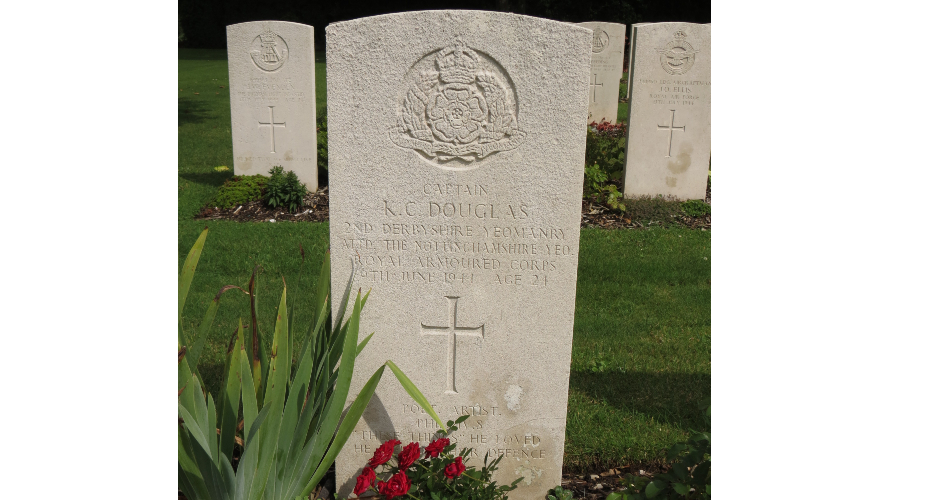D-Day 80th Anniversary: Time is all I lacked

Keith Douglas: Image courtesy of the Internet Archive
In the week of the 80th anniversary of the D-Day landings, academics from across the Faculty of Arts, Humanities and Social Sciences are providing a series of opinion pieces from different disciplinary contexts. Our third piece has been written by Professor Tim Kendall, of the Department of English and Creative Writing, and focuses on the poignant work of the poet Keith Douglas.
Professor Kendall’s anthology, Poetry of the Second World War, a follow-up to his Poetry of the First World War (2014), is forthcoming from Oxford World’s Classics later this year.
The dearth of English soldier-poetry about D-Day is explained by one simple fact: Keith Douglas did not live long enough to write it.
A veteran of the North African campaign, Douglas had arrived back in England in December 1943. There was no hero’s welcome awaiting him and his fellow Sherwood Rangers. At training camp two months later, he made clear his disgruntlement at being tossed indifferently from one battle to the next:
I feel so savage about this filthy country and the way it is run… I now live in a tin hut and a sea of mud (which freezes every few days) and no laundry arrangements or showers, with about ½ as much food as civilians are eating.
Bored, nervous, exhausted and aggrieved, Douglas was being forced to do it all again. He was certain that next time he would not survive.
At Wadi Natrum a year or so previously, Douglas had deserted to the front line from his cushy job in HQ. ‘I like you, sir’, his batman told him. ‘You’re shit or bust, you are.’ As luck of one sort or another would have it, the Sherwood Rangers had taken such a severe hammering in the previous days that they were short of officers, so Douglas’s serious indiscretion was overlooked and even welcomed. What he sought more than anything was experience, and the Desert War provided no shortage of that: the following two months of fighting became his material for some of the most powerfully disconcerting combat poetry in English as well his classic battlefield memoir Alamein to Zem Zem. Now, though, the job was finished. Discharged from hospital after suffering severe injuries, he told friends in Cairo that ‘he had seen everything that was necessary. Everything else would be repetition, waste.’ Back in England, repetition and waste were all that lay ahead.
Two poems stand out from those months in training camp. The first, a short lyric titled ‘To Kristin Yingcheng Olga Milena’, names a string of ex-girlfriends as the poet (quite literally) sets his affairs in order:
Here I give back perforce
the sweet wine to the grape
give the dark plant its juices
what every creature uses
by natural law will seep
back to the natural source. That most unDouglaslike of words, ‘perforce’, makes a ritual of resignation as the poet foresees a future where his life leaves no trace. It is solemn, dignified and all the more affecting for swallowing its anger. Douglas must give up life’s pleasures ‘perforce’, and there is no point mustering the energy to resist an irresistible fate.
The same sense of defeat permeates Douglas’s last poem. As its title hints, ‘On a Return from Egypt’ is Janus-faced, moving from past to present to future and from Egypt to England to France. (In the final line of his final letter, Douglas outwits the censor: ‘Well, fair stands the wind for…?’) The poet is now exercising his ‘depleted fury’ in a colourless landscape, his heart ‘growing colder’ as he waits ‘in the wings of Europe’. He veers between uncertainty of his fate and the sure knowledge that he is doomed:
And all my endeavours are unlucky explorers
come back, abandoning the expedition;
the specimens, the lilies of ambition
still spring in their climate, still unpicked:
but time, time is all I lacked
to find them, as the great collectors before me.
The next month, then, is a window
and with a crash I’ll split the glass.
Behind it stands one I must kiss,
person of love or death
a person or a wraith,
I fear what I shall find. This is a paradoxical kind of self-elegy: fearing death but dead already. As far back as Lucretius, poets have described the plucking of flowers as a symbol of poetic originality, but Douglas’s own ‘lilies of ambition’ have gone unpicked, and now it is too late. It always seems futile to speculate about what a poet might have achieved, had he not died young. Douglas does the speculating for us: ‘time is all I lacked’.
Even so, the poem ends by daring to imagine, however tentatively, the prospect of a better fate. The incomplete rhyme ‘window/find’ stops the poet short, held still for a moment before he must inevitably crash through the glass. Maybe, just maybe, love rather than death awaits. Fate is left as an ellipsis: the reader knows only too well what the poet cannot know for sure.
On 9 June, D+3, the Sherwood Rangers had reached high ground south-east of Bayeux, above the village of St Pierre. Douglas’s close friend was given the dangerous job of making a recce of the German positions, so Douglas insisted that he should go as well. The two men came under heavy machine-gun fire but managed to return with the necessary information. As Douglas ran to make his report, he was instantly killed by a burst of mortar fire. He was 24 years old.




